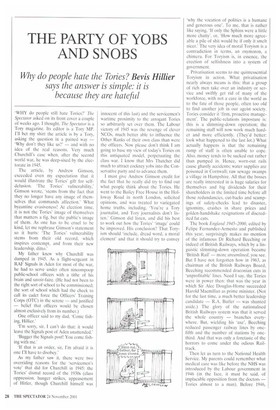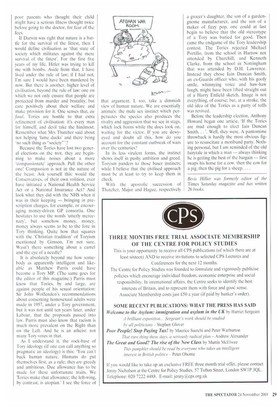THE PARTY OF YOBS AND SNOBS
Why do people hate the Tories? Bevis Hillier
says the answer is simple: it is because they are hateful
'WHY do people still hate Tories?' The Spectator asked on its front cover a couple of weeks ago. I thought, The Spectator is a Tory magazine. Its editor is a Tory MP. I'll bet my shirt the article is by a Tory, asking the question in a pained way — 'Why don't they like us?' — and with no idea of the real reasons. Very much Churchill's case when, after the second world war, he was deep-sixed by the electorate in 1945.
The article, by Andrew Gimson, exceeded even my expectation that it would illustrate the Tories' gift for selfdelusion. 'The Tories' vulnerability,' Gimson wrote, 'stems from the fact that they no longer have any image of themselves that commands affection.' What byzantine evasiveness! At election time, it is not the Tories' image of themselves that matters a fig, but the public's image of them. As one has to be cruel to be kind, let me rephrase Gimson's statement so it hurts: 'The Tories' vulnerability stems from their old record, which inspires contempt, and from their new leadership, ditto.'
My father knew why Churchill was dumped in 1945. As a flight-sergeant in RAF Signals in Aden for most of the war, he had to serve under often nincompoop public-school officers with a tithe of his brain and savoir-faire. (He had not been to the right sort of school to be commissioned; the sort of school which had the cheek to call its cadet force the Officers' Training Corps (OTC) in the serene — and justified — belief that officers would be chosen almost exclusively from its number.) One officer said to my dad, 'Come fishing, Hillier.'
'I'm sorry, sir, I can't do that: it would leave the Signals post of Aden unattended.'
'Bugger the Signals post! You come fishing with me.'
'If that is an order, sir, I'm afraid it is one 1'11 have to disobey.'
As my father saw it. there were two overriding reasons for the 'servicemen's vote' that did for Churchill in 1945: the Tories' dismal record of the 1930s (class oppression, hunger strikes, appeasement of Hitler, though Churchill himself was innocent of this last) and the servicemen's wartime proximity to the arrogant Tories so arbitrarily set over them. The Labour victory of 1945 was the revenge of clever NC0s, much better able to influence the Other Ranks of their own class than were the officers. Now please don't think I am going to base my view of today's Tories on this antiquated model, perpetuating the class war. I know that Mrs Thatcher did much to attract cockney yobs into the Conservative party and to advance them.
I must give Andrew Gimson credit for the fact that he really did try to find out what people think about the Tories. He went to the Bailey Free House in the Holloway Road in north London, solicited opinions, and was treated to variegated home truths, including, 'You're a Tory journalist, and Tory journalists don't listen.' Gimson did listen, and did his best to work out how the Tories' image' could be improved. His conclusion? That Toryism should 'include, dread word, a moral element' and that it should try to convey 'why the vocation of politics is a humane and generous one'. To me, that is rather like saying, 'If only the Sphinx were a little more chatty', or, 'How much more agreeable a pile of shit would be if only it smelt nicer.' The very idea of moral Toryism is a contradiction in terms, an oxymoron, a chimera. For Toryism is, in essence, the erection of selfishness into a system of' government.
Privatisation seems to me quintessential Toryism in action. What privatisation nearly always means is this: that a group of rich men take over an industry or service and swiftly get rid of many of the workforce, with not a care in the world as to the fate of those people, often too old to find another job in our ageist society. Tories consider it 'firm, proactive management'. The public-relations imposture is: this is a slimming-down operation; the remaining staff will now work much harder and more efficiently. (They'd better: look what happened to the last lot.) What actually happens is that the remaining rump of staff is often unable to cope. Also, money tends to be sucked out rather than pumped in. Hence, worn-out rails cause ghastly accidents; water supplies are poisoned in Cornwall; raw sewage swamps a village in Hampshire. All that the bosses are really interested in is huge salaries for themselves and big dividends for their shareholders in the limited time before all those redundancies, cut-backs and scampings of safety-checks lead to disaster, ignominy, crashes in share prices and golden-handshake resignations of discredited fat cats.
The book England 1945-2000, edited by Felipe Fernandez-Armesto and published this year, surprisingly makes no mention of the infamous Dr Richard Beeching or indeed of British Railways, which by a linguistic slimming-down operation became 'British Rail' — more streamlined, you see. But I have not forgotten how in 1963, as chairman of the British Railways Board, Beeching recommended draconian cuts in 'unprofitable' lines. Need I say, the Tories were in power then: that was the year in which Sir Alec Douglas-Home succeeded Harold Macmillan as prime minister. (Not for the last time, a much better leadership candidate — R.A. Butler — was shunted aside.) The glory of the nationalised British Railways system was that it served the whole country — branches everywhere. But, wielding his 'axe', Beeching reduced passenger railway lines by onefifth and the number of stations by onethird. And that was only a foretaste of the horrors to come under the odious Railtrack.
Then let us turn to the National Health Service. My parents could remember what medical care was like before the NHS was introduced by the Labour government in 1946 (in the face, it must be said, of implacable opposition from the doctors — Tories almost to a man). Before 1946, poor parents who thought their child might have a serious illness thought twice before going to the doctor, for fear of the fees.
If Darwin was right that nature is a battle for the survival of the fittest, then I would define civilisation as 'that state of society which militates against the mere survival of the fittest'. For the first five years of my life, Hitler was trying to kill me with bombs. Aside from that, I have lived under the rule of law; if I had not, I'm sure I would have been murdered by now. But there is another, higher level of civilisation, beyond the rule of law: one on which we not only ensure that people are protected from murder and brutality, but care positively about their welfare and make provision for it. One senses that, au fond, Tories are hostile to that extra refinement of civilisation: it's every man for himself, and devil take the hindmost. Remember what Mrs Thatcher said about not helping 'lame ducks' and there being 'no such thing as "society"' ?
Because the Tories have lost two general elections on the trot, they are beginning to make noises about a more 'compassionate' approach. Pull the other one Compassion is not in the nature of the beast. Ask yourself this: would the Conservatives, of their own volition, ever have initiated a National Health Service Act or a National Insurance Act? And look what they did with the NHS when it was in their keeping — bringing in prescription charges, for example, or encouraging money-driven GP consortia. One hesitates to use the words 'utterly mercenary', but somehow money, money, money always seems to be to the fore in Tory thinking. Quite how that squares with the 'Christian tradition' of Toryism mentioned by Gimson, I'm not sure. Wasn't there something about a camel and the eye of a needle?
It is absolutely beyond me how somebody as apparently intelligent and likeable as Matthew Parris could have become a Tory MP. (The same goes for the editor of this magazine.) Parris must know that Tories, by and large, are against people of his sexual orientation: Sir John Wolfenden's recommendations about consenting homosexual adults were made in 1957, under a Tory government, but it was not until ten years later, under Labour, that the proposals passed into law. Parris must also know that racism is much more prevalent on the Right than on the Left. And he is an atheist: not many Tory votes in that.
As I understand it, the rock-base of Tory ideology (if one can call anything so
pragmatic an ideology) is this: 'You can't
buck human nature. Humans do put themselves first, as a rule; they are greedy
and ambitious. Due allowance has to be made for these unfortunate traits. We Tories make that allowance; the left-wing, by contrast, is utopian.' I see the force of that argument. I, too, take a dirnmish view of human nature. We are essentially animals: the male sex instinct which perpetuates the species also produces the rivalry and aggression that we see in stags, which lock horns while the does look on, waiting for the victor, If you are dewyeyed and doubt all this, how do you account for the constant outbreak of wars over the centuries?
In its less virulent forms, the instinct shows itself in pushy ambition and greed. Toryism panders to those baser instincts; while I believe that the civilised approach must be at least to try to keep them in check.
With the apostolic succession of Thatcher, Major and Hague, respectively a grocer's daughter, the son of a gardengnome manufacturer, and the son of a maker of fizzy pop, one could at last begin to believe that the old stereotype of a Tory was buried for good. Then came the endgame of the Tory leadership contest. The Tories rejected Michael Portillo, from the school in Harrow not attended by Churchill, and Kenneth Clarke, from the school in Nottingham that was attended by D.H. Lawrence. Instead they chose lain Duncan Smith, an ex-Guards officer who, with his goofy smile, whinnying voice and haw-haw laugh, might have been lifted straight out of a Harry Enfield sketch. Image is not everything, of course; but, at a stroke, the old idea of the Tories as a party of toffs was revived.
Before the leadership election, Anthony Howard began one article, If the Tories are mad enough to elect lain Duncan Smith. . '. Well, they were. A pantomime throwback is hardly the most obvious figure to resuscitate a moribund party. Nothing personal, but I am reminded of the old fairytale in which a man — always thinking he is getting the best of the bargain — first swaps his horse for a cow. then the cow for a pig, then the pig for a sheep. .
Bevis Hillier was formerly editor of the Times Saturday magazine and has written 26 books,



















































































 Previous page
Previous page